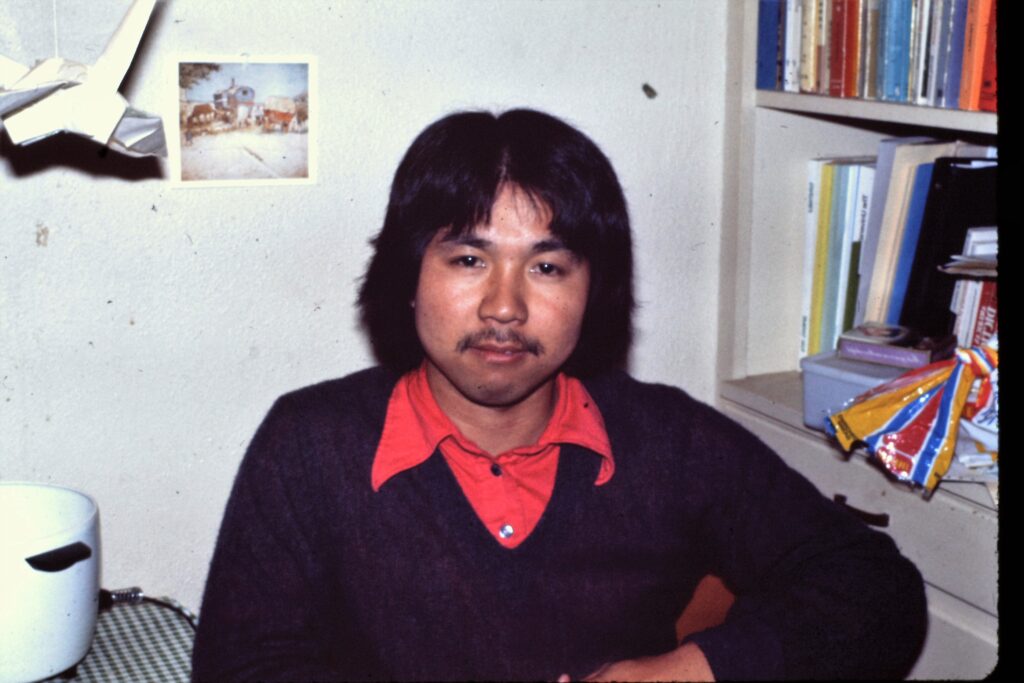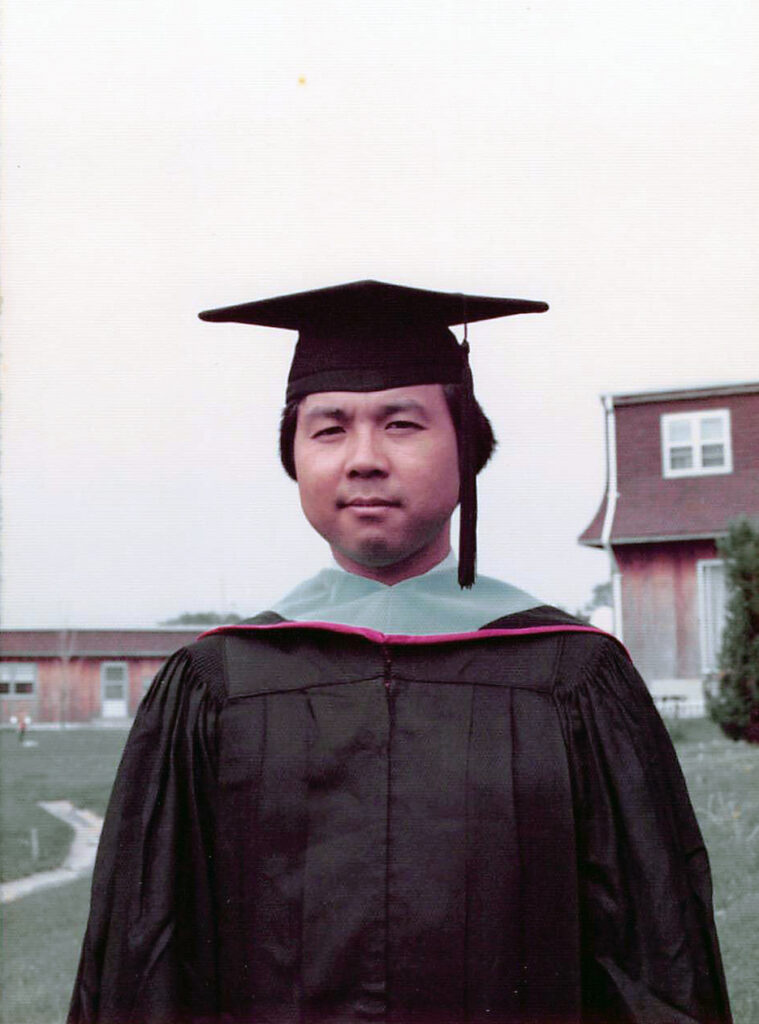My major at the Department of Linguistics at KU was Applied Linguistics. Since I lacked enough background knowledge about linguistic theories, I had to take the required subjects such as Introduction to Linguistics, Phonetics, Acoustic Phonetics, Generative Transformational Grammar, sociolinguistics, Comparative Cultures, etc. The most difficult subjects to learn were Phonetics and Generative Transformational Grammar which required me to remember detailed content and also my analytic/mathematical skill to treat the given unknown language data. Their mid-term and final tests were 3-hour long ones and detailed answers with concrete examples were requested. Both of them forced me to study for long hours daily. I also took practical subjects such as Language
Teaching, used for reviewing each performance, and discussed (Micro Teaching style). Then there were no personal computers so we had to type the handouts with an electric typewriter and printed enough copies with a rotary press to share.
Since I didn’t belong to the Department of English Language and Literature, I enjoyed learning new knowledge, but the content was a very high-level one so I felt lacking my English knowledge and skills. I had to focus on studying a lot in the enrolled classes and it was a very useful experience in my life. The only relaxed time I had was from the night of Friday to Saturday evening.
大学院(言語学部 Department of Linguistics)での専門は応用言語学(Applied Linguistics)。とはいえ、背景知識がなかったため、言語学の基礎理論を学ぶ必修科目を取得しなければならなく、言語学概論(Introduction to Linguistics)から始まって、音声学(Phonetics)、音響音声学(Acoustic Phonetics)、生成変形文法論(Generative Transformational Grammar)、社会言語学(Socio-linguistics)、比較文化論(Comparative Cultures)、など多くの科目を履修した。その中で一番苦しい思いをした科目は細かい知識を求められた音声学や数学的な知識が必要だった生成変形文法のクラスであった。前者は英語以外にも様々な言語の音声規則を学び、その特徴の解析をしたり、中間・期末テストはそれぞれ3時間という長丁場のもので、詳細な回答を求められた質問群に回答するのが大変であった。後者は毎週の課題で難しい生成変形文法の解析を求められたもので、この科目だけに日曜に丸一日かかって課題をこなしていた覚えがある。詳細な言語教授法(Language Teaching Methodology)のような実践的な科目も履修し、4技能(スピーキング、リスニング、リーデイング、ライテイング)の特定スキル学習のための教材を準備し、院生同士がお互いに批評し合うために、ビデオ録画して振り返りをするMicro Teachingの手法を学んだりもした。当時はパーソナル・コンピュータがない時代でもあり、紙のハンドアウト教材は電動タイプライターで印字したものを輪転機でコピーを作り、配布し、共有し合うのが普通であった。
日本の大学学部では英語科教員養成課程や言語学コースを専攻していなかったので、全てが真新しい内容ばかりであり、「学び」自体に新鮮みを感じていたが、高度の学習内容に対する自分自身の英語力の不十分さを感じながら、理解して記憶することも多く、ゆとりは全くなかった。これまでの我が人生で一番勉強した時期であったとも言え、米国大学院留学の意義を十分に確認できた経験であった。唯一リラックスできたのは、金曜日の夜から土曜日までで、後は勉強一色の日々だった。

When one year and a half passed after enrolling in the Department of Linguistics, I started to feel some difficulties to continue studying Linguistics subjects and decided to transfer to Curriculum & Instruction of the Department of Education that offered TESL(Teaching English as a Second Language) program – collaboration course from Departments of Linguistics, English, and Education. Many international students including one of my friends, Late Professor Kenji Kitao of Doshisha University. Also, I got a TA job to teach practical Japanese conversation through Prof. Yamamoto of the Department of Asian Studies and helped me a lot financially with the half-reduced tuition. Of course, this TA experience was a very useful and valuable one.
Before going to the US to study, I felt very unsatisfactory and necessity of improving the pre-service English teacher training curriculum in Japan. So I researched and wrote my MA thesis titled “Training of Teachers of English as a Second Language in Japan.” I was planning to advance to a Ph. D degree course, but I gave up and returned home to Japan because I had a younger brother and a younger sister who needed more educational and financial supports from my parents. I was lucky to have my dad who didn’t speak English well, but who came to attend my graduation ceremony in May 1978. He had to transit a few times to fly over to Kansas City Airport. After graduation, we flew to Chicago, San Diego, Los Angeles, and San Francisco for sightseeing together on the way back to Japan.
約1年半が過ぎようとしていた時に、応用言語学という学問の意義は十分に認めていたものの、言語学部修士課程での継続的な勉学に嫌気がさして、もっと実践的なプログラムに移った方が、帰国後の就職や人生そのものに寄与できるのではと思い、決断をして、教育学部Curriculum & Instructionプログラムへ転学した。言語学部、英語学部、教育学部の連携コースとしてTESL(Teaching English as a Second Language)プログラムが提供されていたからである。同じように感じた多くの国際学生たちも転学をしていたことも小生に大きな影響を与えたと思う。故北尾謙治同志社大学教授もその中にいた。幸いにも日本語教育をしていたアジア研究学部日本語学科の山本先生から協力を依頼され、一年間の有給Teaching Assistantとして日本語会話科目を担当させてもらった。大学の学費が半額になったメリットもあったが、その時の教育経験はとても有意義であった。
留学する前から日本における伝統的なスタイルでの英語教員養成プログラムが不十分であると考えていたので、大学での英語教員養成カリキュラムの分析をして、より良い改善策を提言する修士論文(Training of Teachers of English as a Second Language in Japan)を書き上げた。その後に博士課程への進学も考えたが、3人兄弟の長男でもあるし、弟や妹にも教育費用がかかっていた時代の私費留学であったため、まずは帰国して就職し、親の世話にならず独立しようと決めた。大学の卒業式・大学院の修了式には、簡単な英語しかできなかった父親が何度か飛行機を乗り継いで来てくれ、空港まで迎えに行ったり、帰国前の米国内旅行(シカゴ、サンジエゴ、ロサンゼルス、サンフランシスコ)を一緒にして、大変良い思い出となった。父には特に米国大学院留学を可能にしてくれ、財政面で支援してくれたことにとても感謝している。以下の写真は1978年5月に10万人が収容できるスタジアムで開催された学部卒業式や大学院修了式の時にレンタルのガウンを着て撮影したもの。

